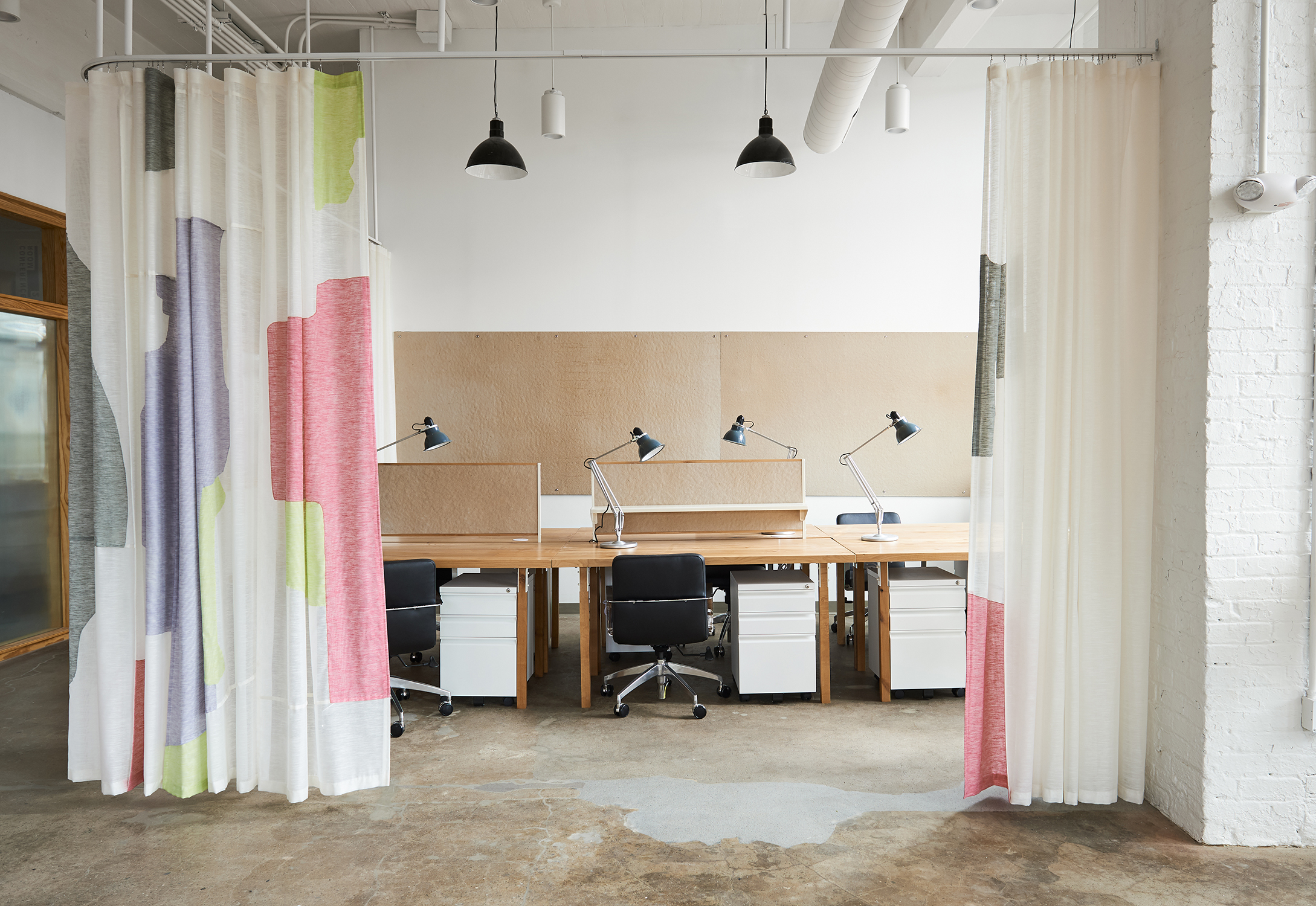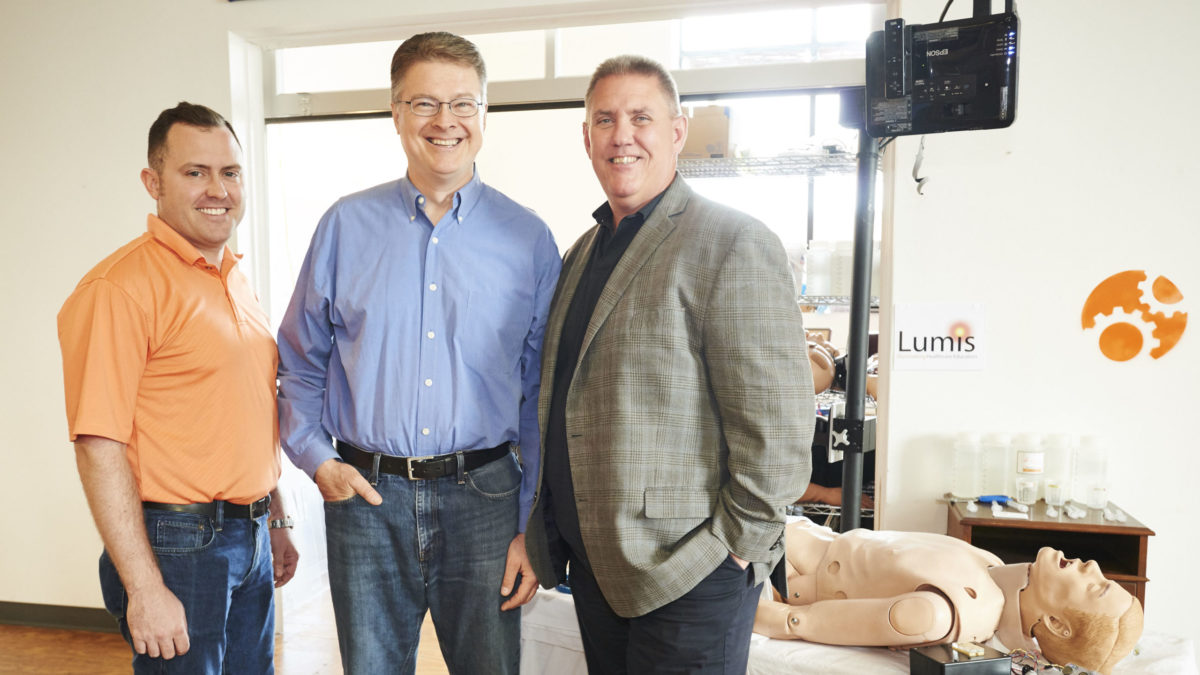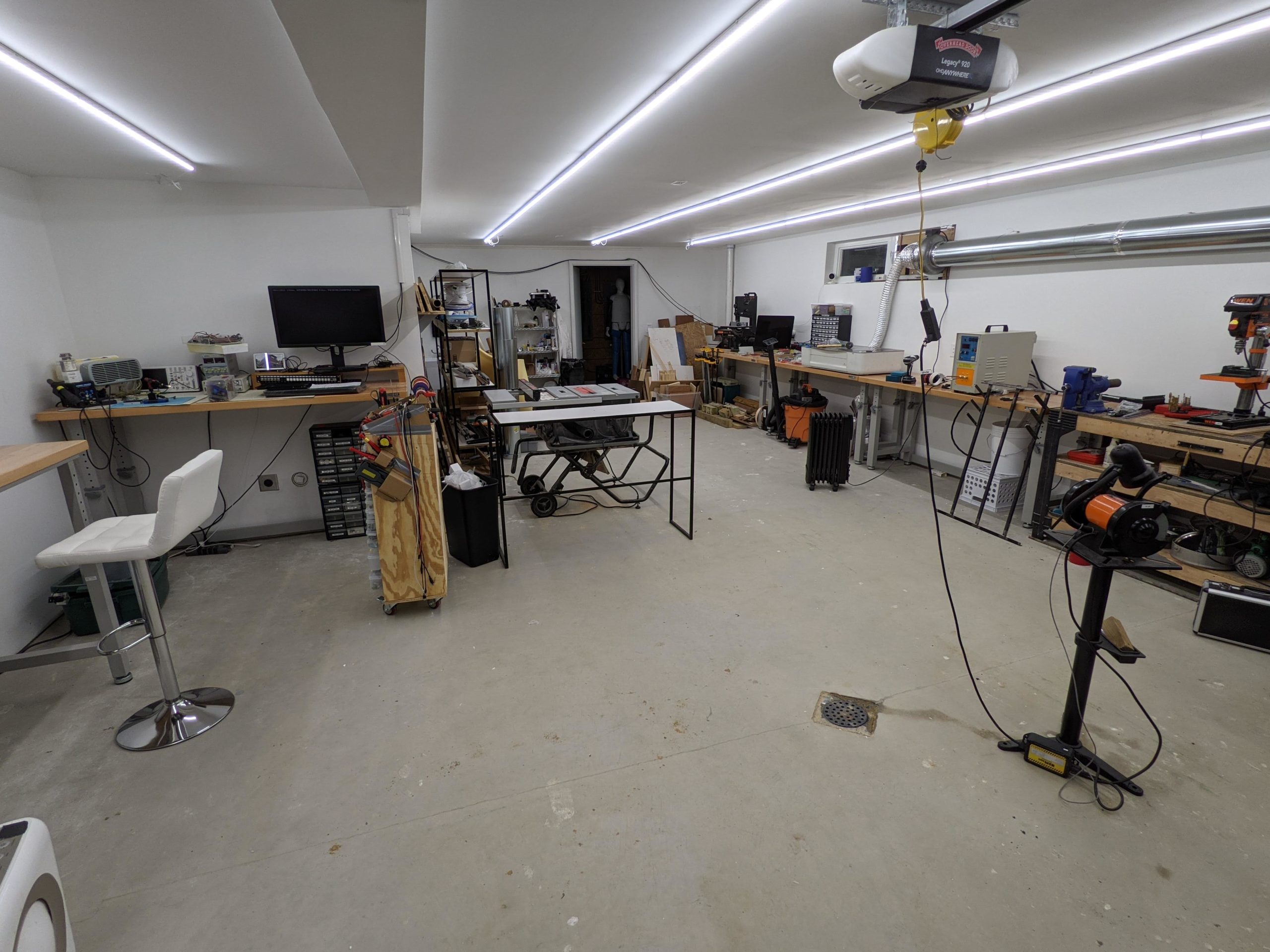When Todd Medma started envisioning the coliving space Maker House a few years ago, he imagined it as the perfect community for hobbyist makers and manufacturers. Now fully occupied, the five-bedroom North Point Breeze home has ample workshop space for woodworking, fabrication, and whatever other projects the roommates dream up together.
The one thing the initial plans were missing? Cubicles.
What was once intended as a living space with room for maker hobbyists has also become a full-time workplace. Tenants moved in just a few weeks ago, and due to the COVID-19 pandemic, the majority of them are stuck working from home full-time, until further notice.
“It’s been an interesting journey here, but we’re making due,” said Medma, who works remotely as a staff product manager at electric car maker Tesla. “The advantage of having a bunch of makers in the house is they can build anything. One of our first projects is a teleconference booth.”
Although finding private places to work during the day has been a challenge, Medma and his housemates are grateful for building this community in a time where in-person interaction is limited. Maker House’s kitchen has become the de-facto breakroom, where housemates often congregate like co-workers during the day to problem solve and share ideas like it’s another day at the office.
As the pandemic approaches the year mark, we’ve seen the workplace blend with living space, and Maker House shows how the lines seem to be getting blurrier. But, with a post-vaccine work environment in sight, many Pittsburgh companies are starting to consider what the office might look like when employees can safely return to the workplace, if they choose to return at all.
The pandemic has forced Pittsburgh companies to reconsider their workplaces, which could lead to some changes down the line as workforces return to the office. They’re not alone: According to a recent study by JLL, 71% of employees surveyed globally are expecting a more flexible work schedule, and over half want a wider variety of places to work.
Technical.ly spoke to a variety of Pittsburgh organizations to see what plans were on the horizon, and how they envision the in-person workplace may look in the future.
The coworking space
“I would say 2020 has been extremely challenging,” admitted Matthew Ciccone, CEO of coworking space Beauty Shoppe, which offers space to individuals and smaller companies out of two historic buildings in Pittsburgh.
It was a sentiment felt everywhere: Early on in the pandemic, coworking spaces globally saw up to a 50% decline in membership.
“For about the first three months of the pandemic, we were essentially closed,” Ciccone said. “But, I think we’re starting to see some light at the end of the tunnel.”
Like so many hospitality businesses in the pandemic, Beauty Shoppe was forced to close its doors during portions of the lockdown, and has had to operate a limited capacity since the pandemic.
While it has caused plenty of pain in the present, the pandemic has sped up the future in other areas. Approaches that once seemed emerging are suddenly commonplace, and that won’t change. Ciccone speculates that the flexibility of coworking could benefit both companies and employees in the area.
“Coworking has always been on the front edge of office trends that were happening, even before the pandemic, and the pandemic has only accelerated that,” he said.

It seems more data from reopening is needed to fully understand how the Beauty Shoppe’s spaces will fare post-pandemic. Yet the conversation around how work will look in the future has already begun. As vaccination programs start to roll out, Ciccone has witnessed Beauty Shoppe members expressing interest in returning to their private offices in the coming months. And new potential customers are reaching out to the Beauty Shoppe to figure out future office plans when their companies have gone full-time remote.
Coworking could offer the flexibility that traditional offices can’t, including temporary meeting space and desk rentals by the month.
Yet, like an office, a coworking space does foster community and networking, something many have missed sorely working from home.
“They just can’t work from the kitchen table anymore,” Ciccone said. “There’s a lot of pent-up interest in and demand for social activities, engaging with the community. Those are things we’re excited about exploring when the opportunity comes.”
The hands-on startup
When the pandemic emerged in March 2020, Lumis Corp, an alum of hardware-focused accelerator AlphaLab Gear, was looking for permanent office space.
“We’d been squatting, with permission, in AlphaLab Gear’s space,” joked Doug Nelson, Ph.D., the CEO of Lumis Corp.
Even as the pandemic forced the accelerator to close its doors to members, Nelson knew he’d have to find a suitable workspace for his team.
Lumis uses AR projection and software to create hands-on learning experiences for healthcare educators and trainees. Its tech requires physical space to work, as well as provide demos to potential customers. For the company to grow, they’d need designated space to work on the hardware.
With a lead on a space in Bloomfield, Lumis had its office set up by June.
“The bulk of our work can be done remotely, and 95% of the time, it may be two people masked up in the office,” Nelson said.

Office functions have evolved as the pandemic limited in-person interaction. What was planned to be a conference room is now a studio, where four webcams hover over Lumis’ patient simulator for live-feed demos with potential customers. More communication and coordination of when team members plan to be in the office is done over Slack.
While they’ve got a setup that works now, Nelson and his employees look forward to a day when they can all be back in the office safely.
“We find that there is definitely more camaraderie among the team members when we’re together and getting things done,” he said.
The pandemic has reframed Lumis’ mindset when it comes to working from home.
“We’re talking about ways in which we have a two-day work from home policy [post-vaccine],” Nelson said, “and if you feel sick at all, don’t come in.”
The pandemic-native workplace
NOVID, an app that pre-detects a user’s risk of COVID, didn’t exist before the pandemic. The app’s team is primarily based in Pittsburgh, but some teammates are as far-flung as Hawaii, explained communications strategist Ariel Leath. NOVID’s fast growth and remote-first culture could serve as a guideline for other teams moving forward.
“We’re working on a very timely issue with the COVID crisis happening before our eyes,” said Leath.
That mentality has shaped the way the team works and will continue to work, remotely.
Availability of employees is posted over Slack channels, and meeting notes are shared after Zoom calls for those who can’t attend live. Because the nature of the virus changes so quickly, Leath finds the team has to balance overcommunication with an “all hands on deck” mentality. But, since they’re juggling across different time zones, the virtual office doesn’t have standard 9-to-5 expectations.
“I think because of what we’re working on, burnout can be very real, especially on the developer side,” Leath said, and there’s an expectation that team members log off and take a break when they need it.

There will likely be a return to normalcy at some point in the workforce post-vaccine. Whenever that comes, Leath thinks what companies learned from remote work in the pandemic can help inform health and happiness in the office.
“Now that we have masks and the concepts of social distancing and tools like NOVID, I hope that people are more cognizant of coming into the office and spreading viruses, like flu season,” Leath said. “There are new ways to mitigate that now that we’ve been forced to learn over the past year.”
While the future of Pittsburgh’s workplaces is largely still unknown, one thing is clear: No matter where employees end up working, there’s still a need for some sort of community and connection. The pandemic may have accelerated the work from home trend, with employees calling for more flexibility than the more rigid, 9-to-5 office culture. But that doesn’t eliminate the need for a workspace altogether.
Even Maker House’s Medma, whose role is full-time remote whether there is a pandemic or not, agrees.
“I’ve never actually met my coworkers in person, and this is the first time where that’s happened. I’ve worked remotely before, but at least I was able to travel regularly,” he explained. “This is actually kind of challenging. Having some kind of real-life social contact — that’s super important.”







